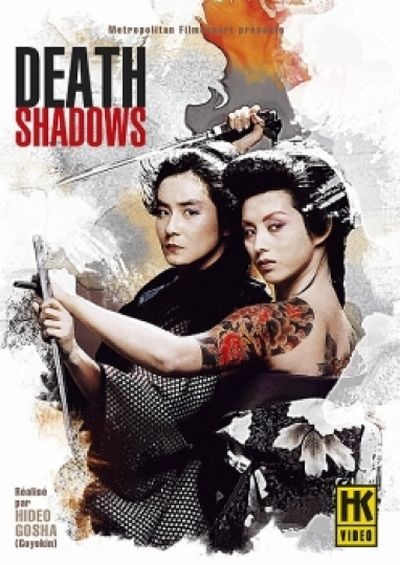★★
“So. Many. Questions…”
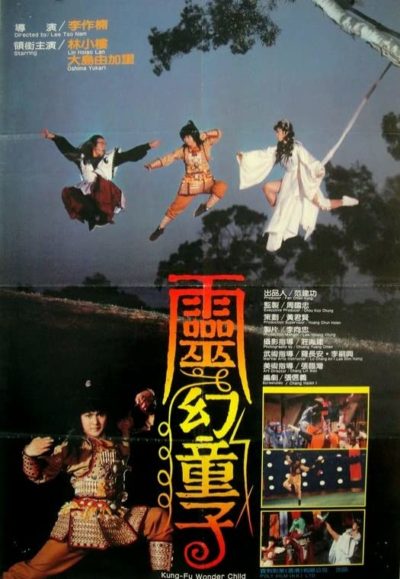 You may have noticed that I’ve been on a bit of a spree with these Taiwanese fantasy-fu flicks of late. However, I think I’m feeling a bit sated with them at this point, and the law of diminishing returns seems to be setting in. There are only so many unconvincing male impersonators, bad effects (both optical and practical) and almost illegible and/or illiterate subtitles a man can take, and I think I’ve reached my capacity in almost of these categories. Fortunately, my queue of such things seems to be nearing an end, with just a couple more to go. Still, after this delirious experience, I feel in need of a week or two’s break from the madness.
You may have noticed that I’ve been on a bit of a spree with these Taiwanese fantasy-fu flicks of late. However, I think I’m feeling a bit sated with them at this point, and the law of diminishing returns seems to be setting in. There are only so many unconvincing male impersonators, bad effects (both optical and practical) and almost illegible and/or illiterate subtitles a man can take, and I think I’ve reached my capacity in almost of these categories. Fortunately, my queue of such things seems to be nearing an end, with just a couple more to go. Still, after this delirious experience, I feel in need of a week or two’s break from the madness.
The villain here is the usual long-haired sorcerer (Li), who is collecting souls for the usual, megalomaniac purposes, and keeping them in large, ceramic jars in his yard. As you do. Among his collection are the father and sibling of Chiu Hsu (a rather under-used Oshima, albeit very early in her career), and she eventually links up with helpful unconvincing male impersonator, Hsiu Chuen (Lin, of course) and not one, but two, annoying comic sidekicks, Mi Fu and Tudor. Hsiu is a servant at a martial arts school, where her grandfather (Long) is the cook. Except Hsiu wants to learn the skills taught at the school, and Gramps is not just the mild-mannered chef he initially appears to be. Hilarity ensues. Well, if your idea of hilarity is a dog peeing on someone’s face, at least.
This is the kind of thing where it feels like the makers threw every idea they came up with onto the screen, regardless of a) relevance and b) whether or not it could be executed with any degree of competence. For example, the first would include the extended opening prologue about a Chinese hopping vampire, and his two kids. It serves no purpose and seems to have strayed in from a completely different movie. As for the second… well, outside of the willingness of Taiwanese stunt-people to fling themselves around and into things for our enjoyment, this rarely gets to passable, even allowing for it approaching forty years in age. I did laugh that one of the monsters Hsiu ends up fighting, is obviously a flying facehugger from Alien.
That said, there is a surprisingly decent stab at mixing animation with live-action, when the villain transforms into an animated dragon for the final battle. If it’s not exactly Who Framed Roger Rabbit, it’s not notably worse than the Disney efforts in this area. In general though, the execution trails far behind the imagination, and as a result, does the latter something of a disservice. The slabs of childish humor are no more of a help. In the film’s defense, the target audience is likely also childish, or at least, child-ish. On that basis perhaps some slack needs to be cut? Yet I couldn’t help thinking, “It was acceptable in the 80s, it was acceptable at the time…”
Dir: Tso Nam Lee
Star: Hsiao-Lao Lin, Yukari Oshima, Jack Long, Hai-Hsing Li





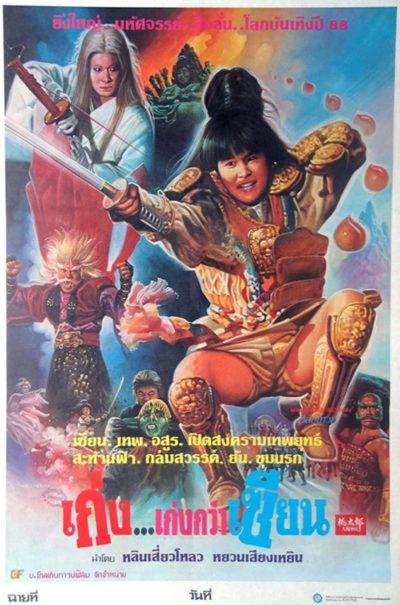 The best way to describe this, is perhaps to say that if I was nine years old, I would think it was the greatest movie I had ever seen. And I would likely be right, at the time. With the benefit of [redacted] more years, and several thousand additional movies under my belt… Not so much. Oh, it’s excessive, insanely imaginative and high energy, to be sure. However, it is also slapdash, incoherent and juvenile. Never mind appealing to nine-year-olds, it often feels like it was made by nine-year-olds. This explanation could be the most logical way to explain how the film manages to misspell its own name in the opening credits, calling itself Magic of Stell.
The best way to describe this, is perhaps to say that if I was nine years old, I would think it was the greatest movie I had ever seen. And I would likely be right, at the time. With the benefit of [redacted] more years, and several thousand additional movies under my belt… Not so much. Oh, it’s excessive, insanely imaginative and high energy, to be sure. However, it is also slapdash, incoherent and juvenile. Never mind appealing to nine-year-olds, it often feels like it was made by nine-year-olds. This explanation could be the most logical way to explain how the film manages to misspell its own name in the opening credits, calling itself Magic of Stell.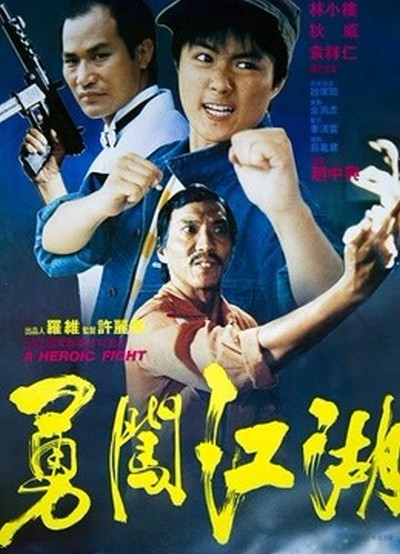 Well, this is certainly… a film. Indeed, of all the movies I’ve seen, it is unquestionably… one of them. Is it good? Bad? I’m still not sure. There are so many shifts in tone here, you’ll get whiplash. It’s clearly intended to be a parody of eighties Hong Kong cinema (even though it was made in Taiwan), yet is equally guilty of committing many of the same sins. I can’t deny the imagination here. A gangster, the unfortunately named Mr. Duh (Chao) is embroiled in a struggle for control of his empire with a lieutenant (Wei) who wants to start dealing drugs. To this end, the boss’s grand-daughter is kidnapped, only to be rescued by conveniently passing martial arts actor Hsiao-Long (Lin). He – and I’ll get back to that – is part of a film studio under his father (Yuen), who specializes in action and special effects. They end up hired by Duh, putting their skills to use to protect the grand-daughter and, at one point, fake the boss’s death.
Well, this is certainly… a film. Indeed, of all the movies I’ve seen, it is unquestionably… one of them. Is it good? Bad? I’m still not sure. There are so many shifts in tone here, you’ll get whiplash. It’s clearly intended to be a parody of eighties Hong Kong cinema (even though it was made in Taiwan), yet is equally guilty of committing many of the same sins. I can’t deny the imagination here. A gangster, the unfortunately named Mr. Duh (Chao) is embroiled in a struggle for control of his empire with a lieutenant (Wei) who wants to start dealing drugs. To this end, the boss’s grand-daughter is kidnapped, only to be rescued by conveniently passing martial arts actor Hsiao-Long (Lin). He – and I’ll get back to that – is part of a film studio under his father (Yuen), who specializes in action and special effects. They end up hired by Duh, putting their skills to use to protect the grand-daughter and, at one point, fake the boss’s death.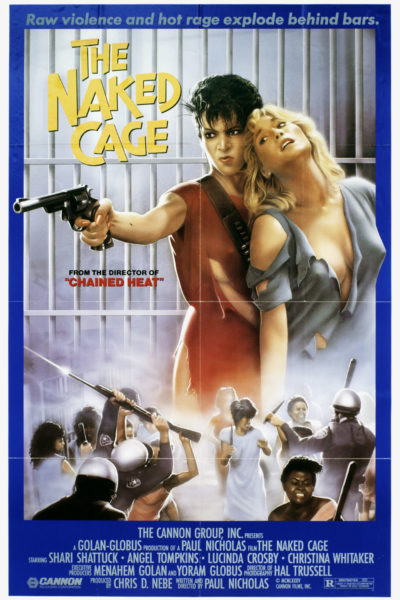
 Yes, in some way, this is probably among the closest the West has come to reproducing the DGAF attitude of Japanese entries like the
Yes, in some way, this is probably among the closest the West has come to reproducing the DGAF attitude of Japanese entries like the 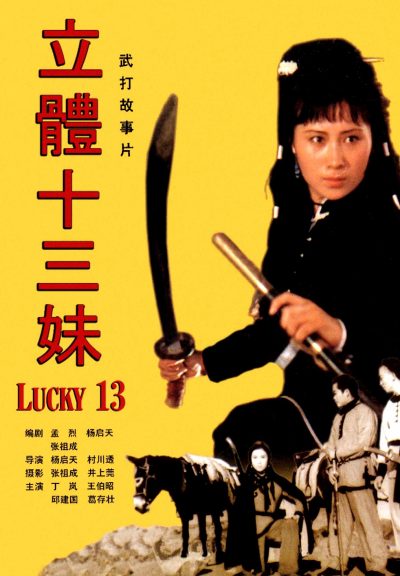 Despite a mangled title, what you have here is a straightforward tale of vengeance – and its attempts to diverge from that narrative are when the film is at its least interesting. Evil general Ji Xian Tang kills the parents of Ho Yu Fung (Ding): well, I suppose technically he only kills her father, her mother committing suicide by the corpse. In some remarkably unsubtle foreshadowing, Yu Fung is told, “This broadsword is our family heirloom. Our hope for vengeance is in your hands.” Given this, it’s no surprise she escapes with the help of a brave sacrifice from a servant, and becomes the pupil of a kung-fu master.
Despite a mangled title, what you have here is a straightforward tale of vengeance – and its attempts to diverge from that narrative are when the film is at its least interesting. Evil general Ji Xian Tang kills the parents of Ho Yu Fung (Ding): well, I suppose technically he only kills her father, her mother committing suicide by the corpse. In some remarkably unsubtle foreshadowing, Yu Fung is told, “This broadsword is our family heirloom. Our hope for vengeance is in your hands.” Given this, it’s no surprise she escapes with the help of a brave sacrifice from a servant, and becomes the pupil of a kung-fu master. This 1986 TV movie was the first film made about an FBI agent while they were still active. Gibson was the fifth black female agent in the bureau’s history: she broke new ground by being the first such assigned to the Fugitive Matters department in the Miami branch, and was also the first to reach a supervisory level within the FBI. That would, however, be well after the story told in this film. It covers how she came to join the FBI, and her first major undercover operation, taking down a gun-running ring operated by ex-NFL star, Adam Prentice (Lawson). However, Gibson starts to find the lines between real-life and undercover work blurring, and begins feeling genuine affection for her target. This doesn’t sit well with her partner, TC (Rollins). If it sounds all very by the numbers… It is.
This 1986 TV movie was the first film made about an FBI agent while they were still active. Gibson was the fifth black female agent in the bureau’s history: she broke new ground by being the first such assigned to the Fugitive Matters department in the Miami branch, and was also the first to reach a supervisory level within the FBI. That would, however, be well after the story told in this film. It covers how she came to join the FBI, and her first major undercover operation, taking down a gun-running ring operated by ex-NFL star, Adam Prentice (Lawson). However, Gibson starts to find the lines between real-life and undercover work blurring, and begins feeling genuine affection for her target. This doesn’t sit well with her partner, TC (Rollins). If it sounds all very by the numbers… It is.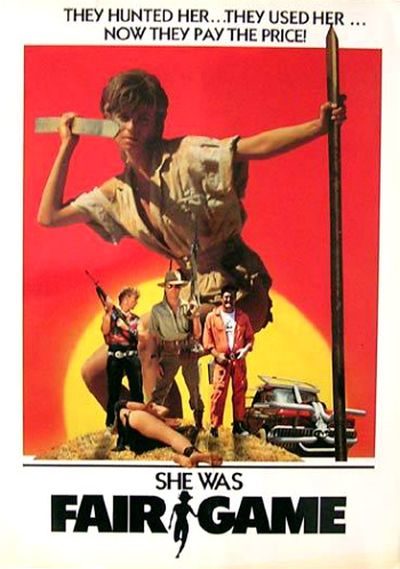 First off, this is not to be confused with the other Australian film of the eighties
First off, this is not to be confused with the other Australian film of the eighties 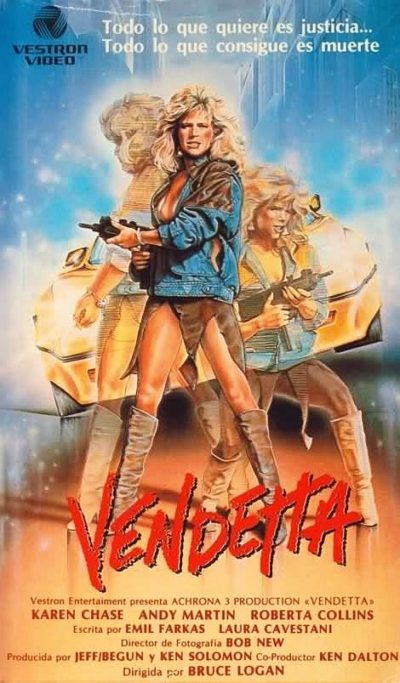 Movie stunt-woman Laurie Collins (Chase) is out for the night with her sister, Bonnie, until the latter accepts the company of a young man. When things get more than a bit rape-y, and Bonnie ends up shooting her attacker dead. She is convicted of second-degree manslaughter, much to the chagrin of her sister. Worse is to follow after Bonnie is sent to prison, as there, she then falls foul of the jail’s top dog, Kay Butler (Martin). Bonnie soon turns up a corpse, with the incident written off as suicide, due to the heroine found in her veins. But Laurie doesn’t believe a word of it, and deliberately commits grand theft auto, among other crimes, in order to be sent to the same prison, where she can find those responsible, and make them pay for what they did to Bonnie.
Movie stunt-woman Laurie Collins (Chase) is out for the night with her sister, Bonnie, until the latter accepts the company of a young man. When things get more than a bit rape-y, and Bonnie ends up shooting her attacker dead. She is convicted of second-degree manslaughter, much to the chagrin of her sister. Worse is to follow after Bonnie is sent to prison, as there, she then falls foul of the jail’s top dog, Kay Butler (Martin). Bonnie soon turns up a corpse, with the incident written off as suicide, due to the heroine found in her veins. But Laurie doesn’t believe a word of it, and deliberately commits grand theft auto, among other crimes, in order to be sent to the same prison, where she can find those responsible, and make them pay for what they did to Bonnie.